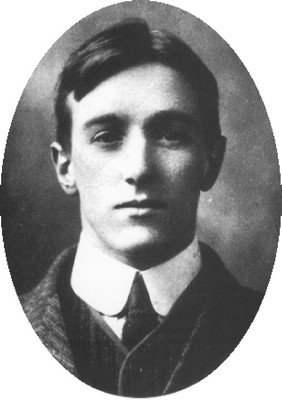- R. G. Collingwood
Infobox Person
name = Robin George Collingwood

image_size = 200px
caption =
birth_date =February 22 ,1889
birth_place =Lancashire
death_date =January 9 ,1943
death_place =Coniston, Cumbria
education =
occupation = Philosopher and historian
spouse =
parents =
children =Robin George Collingwood (
February 22 ,1889 –January 9 ,1943 ) was a British philosopher and historian. He was born atCartmel Fell inLancashire the son of the academicW. G. Collingwood , and was educated atRugby School and theUniversity of Oxford .Collingwood was a fellow of
Pembroke College , Oxford for some 15 years until becoming theWaynflete Professor of Metaphysical Philosophy atMagdalen College , Oxford. He was the only pupil of F. J. Haverfield to survive World War I. Important influences on Collingwood were the Italian Idealists Croce, Gentile and Guido de Ruggiero, the last of whom was also a close friend. Other important influences were Kant, Vico,F. H. Bradley andJ. A. Smith . His fatherW. G. Collingwood , professor of fine arts atReading University , was a student of Ruskin and was also an important influence.Collingwood is most famous for his book "The Idea of History", a work collated from various sources soon after his death by his pupil, T. M. Knox. The book came to be a major inspiration for philosophy of history in the English-speaking world. It is extensively cited, leading one commentator to ironically remark that Collingwood is coming to be "the best known neglected thinker of our time". [Mink, Louis O. (1969). "Mind, History, and Dialectic". Indiana University Press, 1.] Not just a philosopher of history, Collingwood was also a practicing historian and archaeologist, being during his time a leading authority on Roman Britain.
Collingwood held history is "recollection" of the "thinking" of a historical personage. Collingwood considered whether two different people can have the same thought and not just the same content, concluding that "there is no tenable theory of personal identity" preventing such a doctrine.
In "The Principles of Art" Collingwood held (following Croce) that works of art are essentially expressions of emotion. He portrayed art as a necessary function of the human mind, and considered it collaborative activity. In politics Collingwood defended the ideals of what he called liberalism "in its Continental sense"::The the essence of this conception is ... the idea of a community as governing itself by fostering the free expression of all political opinions that take shape within it, and finding some means of reducing this multiplicity of opinions to a unity. [R. G. Collingwood (2005). "Man Goes Mad" in "The Philosophy of Enchantment". Oxford University Press, 318.]
He also published "The First Mate's Log" (1940), an account of a yachting voyage in the Mediterranean, in the company of several of his students.
After many years of ill health Collingwood died at Coniston in January 1943.
Main works published in his lifetime
*"Religion and Philosophy" (1916) ISBN 1-85506-317-4
*"Roman Britain" (1923, ed. 2, 1932) ISBN 0-8196-1160-3
*"Speculum Mentis" (1924)
*"Outlines of a Philosophy of Art" (1925)
*"The Archaeology of Roman Britain" (1930)
*"An Essay on Philosophic Method" (1933, rev. ed. 2005). ISBN 1-85506-392-1
*"Roman Britain and the English Settlements" (withJ. N. L. Myres , 1936, second edition 1937)
*"The Principles of Art" (1938) ISBN 0-19-500209-1
*"An Autobiography" (1939) ISBN 0-19-824694-3
*"An Essay on Metaphysics" (1940, revised edition 1998). ISBN 0-8191-3315-9
*"The New Leviathan" (1942, rev. ed. 1992) ISBN 0-19-823880-0Note that in his essay "Expressionism in Art" Collingwood makes a distinction between expression and emotion in that expression, being transcendant of the five senses precludes action and reaction, and that emotion - a resultant of biochemical activity in body is purely "exhbihition"-'istic' if not invoked by a pure thought.
Posthumously-published works
*"The Idea of Nature" (1945) ISBN 0-19-500217-2
*"The Idea of History" (1946, revised edition 1993). ISBN 0-19-285306-6
*"Essays in the Philosophy of Art" (1964)
*"Essays in the Philosophy of History" (1965) ISBN 0-8240-6355-4
*"Essays in Political Philosophy" (1989) ISBN 0-19-823566-6
*"The Principles of History and Other Writings in Philosophy of History" (2001) ISBN 0-19-924315-8
*"The Philosophy of Enchantment: Studies in Folktale, Cultural Criticism, and Anthropology" (2005) ISBN 0-19-926253-5All 'revised' editions comprise the original text plus a new introduction and extensive additional material.
References
External links
* [http://www.geocities.com/rgcollingwood/ Additional Articles and Documents by R. G. Collingwood]
*sep entry|collingwood|Robin George Collingwood|Giuseppina D'Oro
*sep entry|collingwood-aesthetics|Collingwood's Aesthetics|Gary Kemp
Wikimedia Foundation. 2010.
